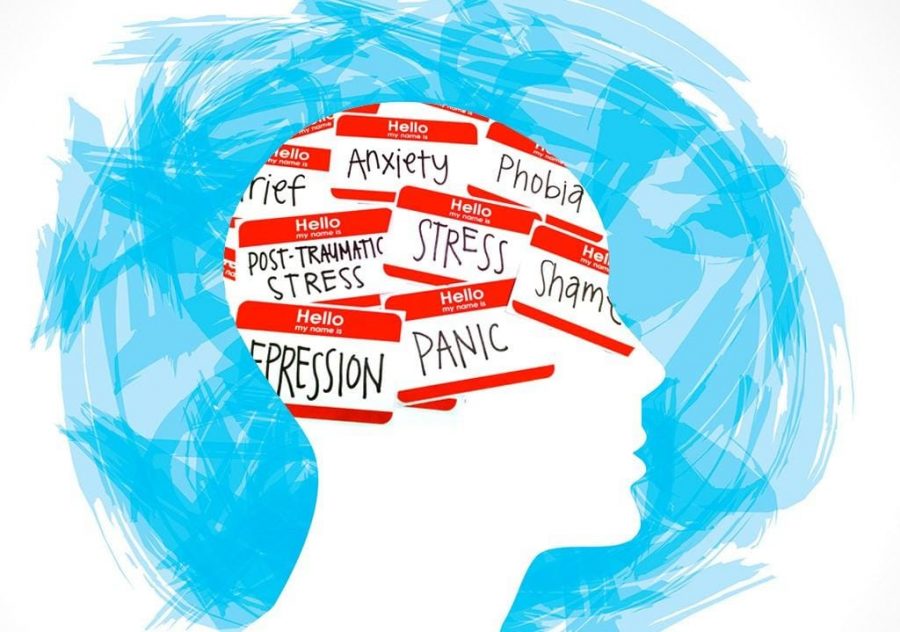It’s Time to Talk About Mental Health
How are you really doing?
Across the world, thousands of different people are all fighting different battles. Soldiers fight on the battlefront. Politicians battle for your support. Advertisements and businesses battle for your attention. It is almost impossible to go a day without a large majority of the world fighting some kind of battle. We fight many battles, but there is one war which we will fight every day for the rest of our lives. Mental warfare. Each person has their own unique form of this battle, but everybody has been drafted into this war.
Most warriors face stress, nervousness, low self-esteem, and fear. In healthy doses, these fights can make the warriors stronger and wiser. However, when these symptoms become too much for the mind to process, some warriors will have to fight a war for a large period of their life: schizophrenia, OCD, Tourette’s, and PTSD, for example. Most people will face stress and recover. However, like real life soldiers, your genetic equipment and your training will influence your ability to fight. The wrong equipment and training could lead to losing the war.
The main crisis with mental warfare is its attackers do not discriminate. One in five Americans have a mental disorder. In Britain, 24% of girls reported experiencing many symptoms of depression by age fourteen. Depressive symptoms in and of themselves tend to be extreme, but on the furthest ends of the spectrum you will find self-harm and suicide. According to an NHS survey in 2013, about 25% of women aged 16-24 have self-harmed, while about 9.4% of men in the same age group have self-harmed. These figures only reflect what the participants are willing to share and the figure could very well be higher. On top of that, in the United States suicide is the second leading cause of death for people aged 10-34. Yet as a society we have decided that it is okay to let these people fight silently, rather than confront the facts head on and push for change.
Mental health is a war. A war that people fight every day. Most people choose to fight alone. You may not know if your friend has intense anxiety, if a classmate is struggling with an eating disorder, or if a teacher is fighting depression. It’s a war no one should have to fight alone anymore and yet we do. So why? It all starts with stigma. Stigma starts as a fear of mental health, due to negative portrayals of it and misinformation. When a large majority of the population have such preconceptions, it becomes difficult to talk about mental health and how to deal with it. This could very well lead to people avoiding treatment. On top of stigma, many people are simply unaware that they have a mental disorder and have accepted their own life experience as normal, without even knowing that others don’t have the same obstacles that they do.
The first step to overcoming stigma is learning about mental health issues. One of the biggest mental health problems that confront the student population are anxiety and depression. They tend to come as a package deal, but they also do come separately. Anxiety is more than just feeling nervous and jittery. Anxiety feels like walking on a tightrope while trying to balance a large variety of objects. Sometimes you make it to the edge and get a breather. The rest of the time, you have a high sense of fear about everything around you. It’s likely you know some people who have a diagnosis with an anxiety disorder, so this article would definitely help familiarize you with how to help an anxious person.
Similar to a general anxiety, panic disorder is perhaps another common mental disorder you will find among students. Panic disorder is described by people who suddenly are seized by terror called a panic attack and may begin to shake, sweat, and experience sensory overload. There are a wide variety of symptoms associated with a panic attack, but a panic attack interferes with a person’s ability to function. Each person will react differently to a panic attack, and different things will calm them down, but this article provides a very good overview of how to deal with panic attacks.
Depression is completely different from the last two. If anxiety is a state of constantly being aware, depression is a state of numbness. Individuals with depression experience lack of motivation, sleep disorders such as hypersomnia or insomnia, feelings of hopelessness, and on the more extreme end suicidal thoughts. However easy it is to joke about depressed individuals, it’s just as easy to forget the reality of their lives. One of the best ways to support depression is by understanding it and what it does to the individual. The NHS and New Zealand Government have really good resources on how to help people with depression.
You’ll fight a wide variety of battles. Some days will be quiet, and you will have to prepare for the days when it gets bad. Other days will be long, the fight intense, and you might even come close to defeat. It’s people who find themselves close to defeat that need the most support from their peers. All it takes to provide this help is to start with a simple question: “How are you doing?” Listen. Let them know that you are here to help and that you want to help them. Help them to find a reason to enjoy being alive. Find ways to help them get through their days. Encourage them to seek professional help. Challenge them to grow and overcome some of the effects of their mental health. Help them learn to love themselves and to eventually love the life they are living.
Countering stigma starts with one of the hardest steps: talking about mental health. Mental health can be scary. Being seized by a panic attack or watching someone’s mood change from one extreme to another is scary. However, by learning the right tactics, you can eventually gain the upper hand and have more control over your mental health. Maybe you learn how to deal with a panic attack in the healthy manner or take the time to explore what makes your mental issues worse. Each of these tactics can make fighting the war easier. Battles aren’t meant to be fought alone. There is no shame in calling your allies for backup when things are looking grim. When you have someone else there to support you, it suddenly becomes a lot easier to overcome your own battles. We can’t fight alone anymore.
RESOURCES:
If you or somebody you know is in crisis or considering suicide, please reach out for help. Immediate help can be found at the following sources: IMAlive, The Trevor Project, or call 0800 111 0 111. If you want to consider long term help, consider visiting a school counselor, your doctor, or try getting help at 7Cups. If you are interested in learning more about mental health or awareness about mental health issues, consider joining Peace of Mind by emailing [email protected].











Zina Sawabini • Nov 20, 2019 at
Fantastic article Micah! Thank you for raising such an important topic.
Alvin Gerstner • Nov 17, 2019 at
Very well researched and written Micah!
Art • Nov 17, 2019 at
Thank you Micah for a wonderful article with such good resources. May it provide hope and help for those who suffer or those who support people in need.